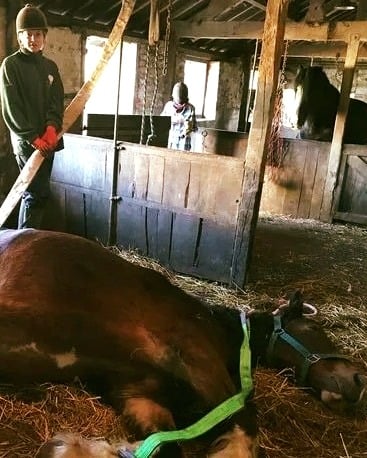When I imagine which animal I’d most want to have by my side in an emergency, my mind instantly goes to dogs. Loyal, quick to react, and deeply attuned to human emotion, dogs have been known for centuries as protectors and helpers. They rush into burning buildings, alert families to danger, and even comfort people in distress. Their instincts to step in and assist — not only humans but also other animals — are remarkable and heartwarming.
Because of that, I never thought much about other animals doing the same. I certainly never expected to hear about a horse being the hero of a rescue — but that’s exactly what happened in this incredible true story.
The incident took place at a quiet countryside stable in Somerset, England, a region known for its rolling hills and family-run farms. There, a massive Shire horse named Beatrice suddenly took a turn for the worse one chilly morning. Beatrice was a 16-year-old Shire, one of Britain’s largest and gentlest draft horse breeds — a true gentle giant, known for her calm temperament and affectionate nature. But that day, her usual strength failed her.
Beatrice had developed equine colic, a severe and often fatal condition that causes extreme abdominal pain. For horses, colic is one of the most dangerous medical emergencies — and once the pain becomes unbearable, it can cause them to collapse. And when a horse goes down, things get critical very fast.
Unlike many animals, horses cannot safely lie down for long periods. Their massive weight can press against vital organs and cut off blood flow to parts of their body — a complication known as reperfusion injury. If they remain on the ground too long, their heart rate and blood pressure can skyrocket, leading to organ failure or even death.
That’s exactly what was happening to Beatrice. Unable to withstand the pain, she finally collapsed in her stable, her huge body trembling and her breathing shallow. Her owners, Donald MacIntyre and Jane Lipington, immediately realized how serious it was. They called out to four other farm workers for help, knowing they were in a race against time.
Together, the six of them worked frantically, trying every method they could think of to lift the one-ton horse back onto her feet. They rigged up an improvised pulley system using a tractor and heavy-duty straps, looping them carefully around Beatrice’s body in the hope that they could gently hoist her upright. The stable echoed with worried shouts, the hum of machinery, and Beatrice’s labored breathing.
But despite all their effort — despite the sweat, the shouting, and the desperate coordination — nothing worked. Beatrice was simply too heavy, and her body too weak. Minutes stretched into an hour, and the atmosphere in the stable grew heavy with dread.
Jane and Donald looked at each other, hearts breaking, and began to face the impossible. The longer Beatrice stayed down, the greater the risk. Her pulse was racing, her body temperature dropping, and her once-bright eyes were beginning to dull. The couple began to talk quietly about setting a deadline — a moment after which they might have to make the most painful decision any animal owner can face: putting her down, to stop her suffering.
Then, with barely twenty minutes left before that deadline, something unexpected happened. Jane suddenly remembered that she hadn’t let Beatrice’s stablemate, Beau, out for his usual afternoon walk. Beau was an 11-year-old stallion, strong, curious, and deeply attached to Beatrice. The two had been inseparable for years — always grazing together, nuzzling over the stable walls, and even refusing to eat unless the other was nearby.
Jane walked to Beau’s stall to let him stretch his legs. But instead of trotting outside, he immediately turned toward Beatrice’s stable. Without hesitation, Beau pushed open the door and went straight to her.
What happened next left everyone speechless.
Sensing that something was terribly wrong, Beau stretched his long neck over the stable divider and began nipping at Beatrice’s neck, nickering softly as if urging her to respond. When she didn’t move, he became more insistent — tugging gently at her mane, then grabbing her halter and trying to pull her head upward.
And then, miraculously, Beatrice stirred. With a low groan, she shifted her legs, rolled slightly to one side, and — to the shock of everyone watching — pushed herself up off the ground.
It was as if Beau’s determination had given her strength.
“We all watched in total amazement,” Jane told Liftable. “He lifted her so that her chest and legs came up off the ground, and with a little encouragement from us, she got shakily to her feet. We quickly walked her out into the yard, trying to keep her steady so she wouldn’t collapse again.”
The entire team stood there, speechless, tears in their eyes, realizing that six humans couldn’t accomplish what one loyal horse had just done.
Beatrice’s recovery after that was steady and hopeful. Thanks to Beau’s instinct and quick action, her blood flow normalized, and she avoided further complications. Within days, she was eating again, walking carefully around the paddock, and even neighing softly to Beau whenever he passed by.
The two have been companions for over four years, and it’s clear that their bond is something special. Horses are deeply social animals — they form attachments, recognize familiar faces, and show remarkable empathy. But what Beau did went beyond simple instinct. It was pure love and loyalty, the kind of connection that mirrors the way humans feel toward their closest loved ones.
Today, Beatrice is healthy and thriving, often seen grazing peacefully next to her rescuer and best friend. The story of Beau and Beatrice reminds us that compassion and courage don’t belong to humans alone — sometimes, they come on four legs and neigh when they save the day.
